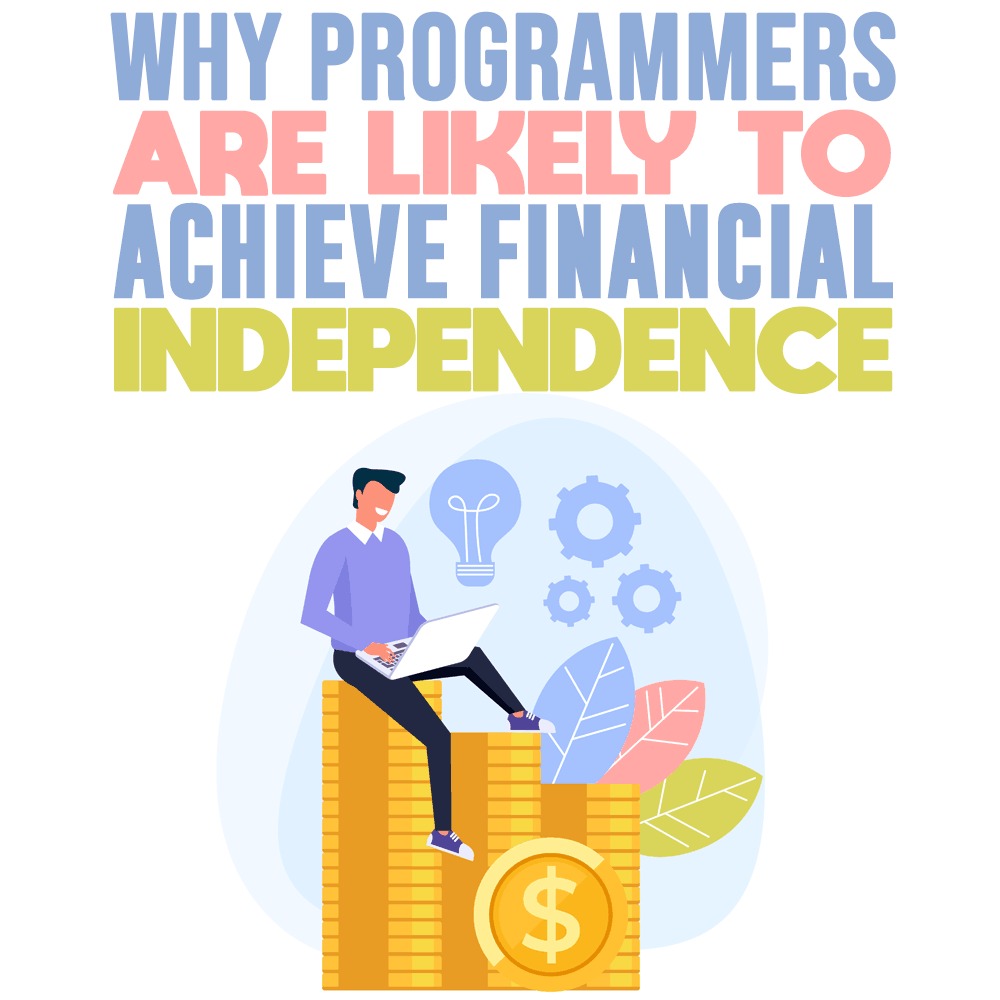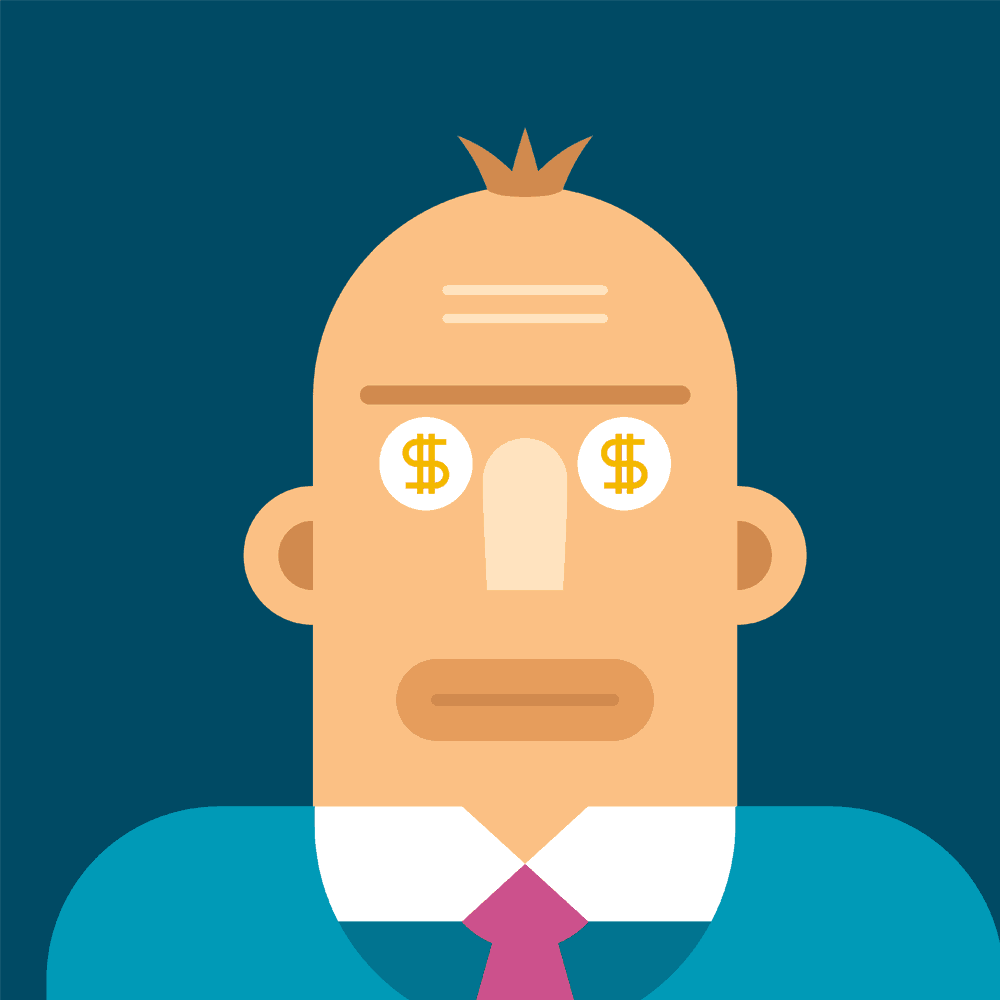
But it’s not uncommon for even “novice” programmers to turn their career into something successful and lucrative relatively quickly. In fact, it’s plausible to make six figures as a programmer—even when you’re still relatively new to the field! Still, reaching that level of success takes dedication, hard work, and a little bit of know-how when it comes to managing your finances.
Like almost any other career, it’s less about how much money you bring in each year and more about how you handle it. It’s easy to mismanage money, especially because receiving a hefty paycheck for the first time is exciting!
As a programmer, though, you can achieve financial freedom quickly keeping in mind a few key factors, including some aspects of your personality that may naturally draw you to saving money and handling it the right way. So why is it easier for programmers to reach financial freedom so quickly?
What Makes Programmers Different?
There are some key characteristics that set programmers apart from others. First of all, there’s the obvious connection to numbers and math. Most people involved in programming enjoy crunching numbers and figuring out solutions. They’re not afraid to think outside the box to reach those solutions, especially if the outcome is beneficial to them.
Think about one programmer who almost everyone across the globe knows: Mark Zuckerberg. The Facebook CEO started a global phenomenon as a programmer at Harvard. But Zuckerberg isn’t the best coder in the world.
What made him stand out when he started Facebook, and what makes him stand out to this day, is his willingness to persist, be creative, and think outside the box in order to achieve success. His skills shifted somewhat from programmer to businessman, but it’s a combination that has clearly worked out well for him with a current net worth of about $67 billion.
Even though Zuckerberg had a great idea and a little luck on his side, for the most part, he displays some common characteristics that most programmers tend to have, including:
- An optimistic attitude
- Excellent communication skills
- Extreme focus
- The ability to learn quickly
- Strong time management and task management skills
All of these common traits and abilities are what set coders up to achieve not only financial success but financial freedom at a young age. After all, when you crunch the numbers and see that it’s possible for you to retire in 15 years instead of 40, you’re probably going to be more dedicated to making that happen.
Why would you want to retire early if you love what you do? Well, who wouldn’t want to be financially sound while they’re still relatively young? A huge source of stress would be eliminated from your life. But even if you do love your work, there are some risks programmers face that could push you to want to retire sooner.
First, it’s very easy for coders to get burned out quickly. When you’re young and eager to grow in the industry, you might have no problem working long hours and essentially devoting your life to your career. As you get older, though, your priorities may change, especially if you want to have a family and don’t want to work so many hours.
Additionally, after several years of working as a programmer, your resume and accomplishments might not be as appealing to employers. They’ll be looking at new candidates with fresh training and new insight into the latest technology.
While it’s important to stay relevant, you may not be able to keep up forever. Working hard and making smart financial decisions now can help you to reach financial freedom before you face these challenges.
Higher Income Means Higher Savings Potential
We already touched on the fact that programmers can easily make six figures a year, and they can do so in a very short amount of time. If you want to experience financial freedom, though, it’s as much about saving as it is about earning.
While that first big paycheck can be exciting, and you might be tempted to make even bigger purchases, you have to consider a more long-term outlook if you truly want to be able to retire early and be financially secure.
There are certain habits people who are good savers tend to follow. The most important one is being able to differentiate what they want from what they need. We all want things from time to time, and some people probably have a bigger wish list than others.
Here are some examples of needs:
- Housing
- Groceries
- Utilities
- Reliable transportation
Here are some examples of wants:
- Music and TV subscriptions
- Expensive nights out
- Grocery delivery services
- Amazon purchases
- Latest technology (phones, computers, etc.)
- Sports car

Expert savers also work diligently on their budgets. As a programmer, you can use your number-crunching knowledge to your advantage when you’re creating a budget. Make sure to include everything from your typical living expenses to “extras” like subscription services.
If you’re not sure how to get started with a budget, try to focus on three major spending categories in your life:
- Fixed expenses: Rent/mortgage, car payment, loan payments, etc.
- Variable expenses: Utility bills, food, etc.
- Nonnecessities: Anything that falls outside of fixed or variable expenses
Starting with these three categories makes it easier to see where your money is going each month and see where you might be able to cut back. You can start to make “sub-categories” from there to get a bit more detailed with your budget, but this will give you a solid jumping-off point to make more sense of what’s coming in and what’s going out each month. For example, instead of budgeting for “food,” you may split it up into “eating out” and “groceries.” Similarly, you could split up “transportation” into “car payment” and “gas.”
How To Handle a High Income
When you receive that first big paycheck, it’s natural to see dollar signs in your eyes. That’s especially true if it comes from your first job out of college and you’ve been struggling to scrape by for the last few years of school.
While it can be tempting to spend that money with abandon, that can lead to a financial disaster later on, like what happened with the startup MoviePass in 2019. Instead, you’ll have to learn very quickly how to handle the responsibilities that come with a high income.
It’s a good idea to pay off any outstanding debts you have before making any major purchases. If you weren’t able to avoid the student loan debt crisis and you have loans to pay off, that’s where your focus should be.
Even if you’re making a lot of money right out of college, it’s better to pay off your debts rather than allowing the interest fees to keep recurring. If you pay them off now, they won’t be a burden to you in years to come.
Try to avoid burying yourself with additional loans as well. If you have the money, pay cash for things, including vehicles, rather than financing. Invest in low-cost index funds, and don’t try to time the market. If you want to learn about investing, one of the best books for this is The Simple Path to Wealth by J.L. Collins.
Within your financial plan, you should have investments in mind. Don’t be afraid to use your money to invest—early and often. As a programmer, you know how to do your research, so find the investment opportunities that are appealing to you, and go for it. It’s one of the best ways to see a return, and it’s a great way to handle a high income.
Still feeling overwhelmed by a high income? Consider the following suggestions to manage your money with more ease:
- Build up an emergency fund that covers anywhere from three to six months of living expenses, and make it a point to leave the fund alone unless absolutely necessary.
- Be careful when it comes to buying a home. It can be tempting to buy a big house, and maybe you can afford the mortgage payment, but you have to consider everything that comes along with it, including utilities and taxes.
- Make use of a financial team. You don’t have to manage your money on your own. People with experience in the industry or those who have “been there” can be a major asset for you and can even help you to make the right investments for a more financially secure future.
The Math Appeals To Intuitive Thinkers
Setting a budget, figuring out the math of saving, and again crunching those numbers might sound intimidating to some. But coders often live to solve complex problems like these! That’s why the combination of making a six-figure income with knowing how to work with numbers can be a huge benefit to you, allowing you to reach financial freedom sooner.
Thinking about your financial future is very similar to working through a complex system or equation. You can’t just focus on what’s right in front of you. You have to also be a forward thinker and consider the math behind your finances in five, 10, or 20 years.
What will your budget look like? How will things change? There are many factors to consider, including potential pay raises, fewer debts, and changes in your spending habits.
If you really want to get detailed and reach your goals sooner, you can use tools like a FIRE Calculator to determine when you will be able to retire.
A FIRE (Financial Independence Retire Early) Calculator can help you to calculate the amount of money you’ll need to save in order to retire early. When you know how much you’ll need based on your spending habits, you reduce the risk of running out of money after retirement, and you can still live comfortably.
The FIRE Calculator uses something called “The Rule of 25” to determine what your investments need to be in order to retire. To figure it out for yourself, simply calculate the annual expenses you’ll have during retirement, and multiply them by 25. If you plan on spending $40,000 each year in retirement, you’ll need to have $1,000,000 saved in order to retire.
While it can be fun to crunch those numbers yourself, give the calculator a try by quickly punching in different facts and figures and determining how quickly you’ll be able to retire. If you want a complete perspective of how to dive into FIRE, check out the book ChooseFI: Your Blueprint to Financial Independence by Chris Mamula, Brad Barrett and Jonathan Mendonsa.
Will All Programmers Reach Financial Freedom?
It’s easy to assume that any career with a six-figure income and opportunities for growth would make it easy for you to reach financial freedom quickly.

However, if you choose to live paycheck to paycheck, and you don’t take the necessary steps to break the cycle of poor spending habits, you won’t be able to achieve financial freedom, especially at a young age.
The average retirement age in the U.S. is 62. The average retirement age for software engineers and programmers is 35-40. Imagine what you can do with your time and with your life by retiring over 20 years early. By securing your investments and making better choices now, you’re setting yourself and your family up for a comfortable life for many years to come.
If you’re a programmer and you’re just getting started in the industry, keep these facts, figures, and tips in mind. They can help you on your journey toward financial freedom so you can enjoy your life and everything that comes with it. All the while, you’ll be free of worrying about being able to pay your bills or provide food for yourself or your family.
